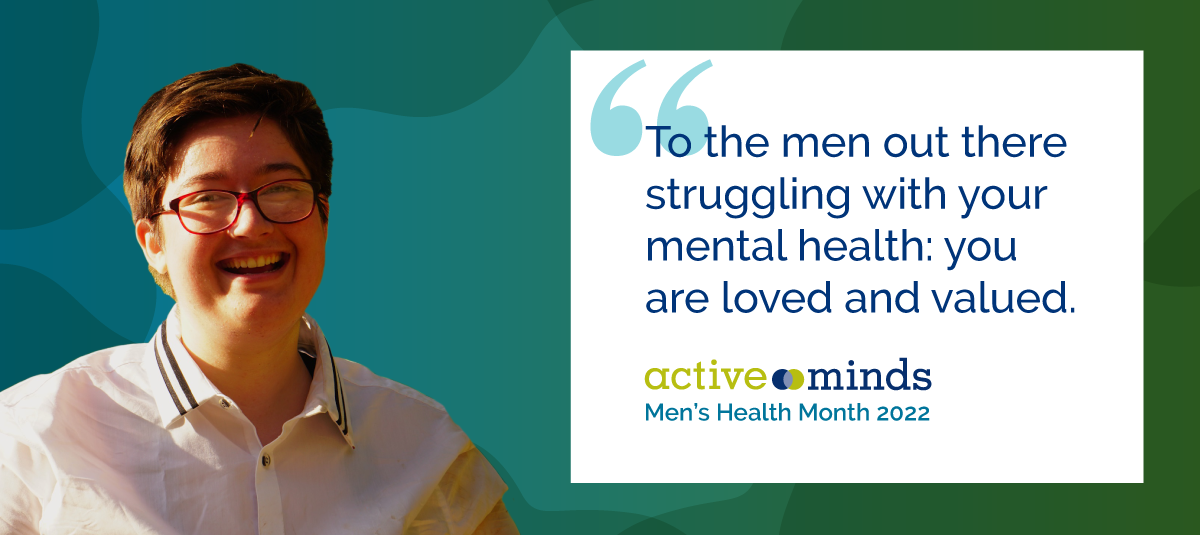Content Warning: This piece contains mentions of suicide statistics.
Being perceived as less of a man when expressing emotion. Facing unrealistic stereotypes and expectations. Being made to feel like your mental health doesn’t matter, or that you can’t struggle with your feelings without being invalidated. As a transgender man, these are all experiences I’ve dealt with first-hand as I’ve navigated my own mental illness while balancing a desire to still be seen for my true self. These experiences are not unique to me, and they don’t have to continue. I’m here to remind you that trans men are men, and men’s mental health is health. So, as part of Men’s Health Month, I want to unpack how I’ve navigated a mental health diagnosis and treatment while at the same time confronting the stigma men everywhere face for talking about mental health.
We all have mental health and many of us may face mental health struggles at some point in our lives. However, the transgender community may face systemic and interpersonal barriers that make receiving help and being accepted more difficult. This includes increased difficulty seeking care, experiences of parental rejection, and lack of access to affirming spaces. According to The Trevor Project, lesbian, gay, bisexual, transgender, and queer (LGBTQ) youth are more than four times as likely to attempt suicide than their peers, and transgender and nonbinary youth are 2 to 2.5 times as likely to experience depressive symptoms, seriously consider suicide, and attempt suicide compared to their cisgender LGBQ peers. Transgender men need support – and that can start with unpacking the stigma around men’s mental health as a whole.
A few years ago, I finally began to receive treatment. During that time, I realized that it wasn’t just me who was having to navigate societal pressure with mental health. I saw how few men were receiving help. I was thinking to myself, “Why are so many men afraid to accept help? Why are so few of us actually talking about what’s going on?” One of my cisgender friends in treatment kept relapsing because he felt he didn’t have anyone to talk to about his mental health and his traumas. This reminded me of my own past: feeling afraid to talk to anyone about what was going on with me for fear of being invalidated. It opened my eyes to the fact that many men, even cisgender ones, were afraid of not being seen as manly, or of being ridiculed. And I realized the best way we’ll change this pattern is by simply opening up the conversation for everyone to be a part of.
When I was hitting my lowest points in 2018 and 2019, I will never forget my therapist in and after treatment who refused to give up on me. I felt heard and seen in a way I hadn’t before. I felt like I could talk about my mental health and be open. This helped me to then know how to talk about my mental health with those around me, and try to change the restricting pattern I had been stuck in for so long.
During and after treatment, I started to find myself. I made friends for the first time and I became a much happier, and healthier person. My family started to see it too, and we have since created a much stronger bond. Now, because of me, my family and friends are starting to talk about mental health more. Because I’ve been so open about my past and present, we’ve begun to implement some changes in our relationships that have improved our bonds, including:
- Letting others know when we are struggling with something.
- Utilizing tools like VAR®, or Validate, Appreciate, Refer®, Active Minds’ everyday tool for everyday challenges.
- Practicing honest communication and boundaries.
- Reminding each other that we are only human, and it’s okay to make mistakes!
To all the men out there struggling with your mental health: you are loved and valued. And when it gets heavy, just keep going because it can and will get easier. We’re not alone. There is always someone out there who is willing to listen. To hear your story. To give you hope and not give up on you. You are enough and yes, you DO matter.




